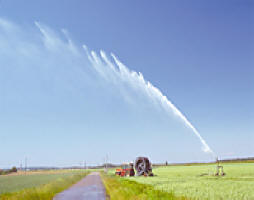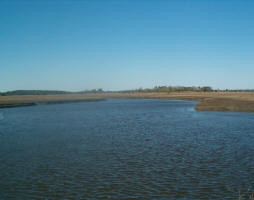 Darfur International Water Conference: Water for Sustainable Peace 2011
Darfur International Water Conference: Water for Sustainable Peace 2011
The Government of Sudan and major donors and organizations expressed their intention to make significant pledges to the global appeal launched at the Darfur International Conference on Water for Sustainable Peace held 27-28 June in Khartoum.
The United Nations and the Sudan Ministry of Irrigation and Water Resources introduced the appeal for some $1 billion for six years of 65 inter-related water system projects to reverse the rapidly declining water supply in Darfur and in doing so to tackle one of the major factors contributing to the ongoing conflict as well as threatening the livelihoods of ordinary Darfuris.
More than 600 water and development experts, Darfur state and Sudan federal authorities and technical experts, and representatives of national and international organizations participated in the Conference, Media and others.
“Between pledges and expressions of interest, more than one half of the Appeal has been met,” said Nils Kastberg, UNICEF Country Representative for Sudan, adding that UNICEF itself intends to continue its $23 million annual expenditure on water projects in Darfur.
The largest commitment came from the Government of Sudan which said it would contribute $216 million, as well as forgive tens of millions of dollars in VAT and other import taxes for water supply investments. Donors expressing interest in major pledges included the Arab League, whose representative said that several Arab states had indicated they would give a total of well over $100 million for the six years.
The Islamic Development Bank and African Development Bank, as well as representatives of Turkey and Japan, indicated their interest in supporting water management projects in Darfur and would respond positively to the Appeal. The United Kingdom and the United States indicated they would support work in the sector.
The urgency of rebuilding and enhancing a sustainable water supply system for Darfur in order to build a sustainable peace was a major theme expressed throughout the conference. Competition for dwindling natural resources, in particular water, had contributed to the conflict and would ensure its continuation if not addressed urgently, several speakers stressed.
The link between water and peace inspired the AU-UN peacekeeping mission (UNAMID) to collaborate with Sudan water officials and UN country team members UNICEF, UNDP, UNESCO and UNEP to organize the Water Conference.
The Government’s pledge was announced by Presidential Advisor Ghazi Salahaldeen who added that “The Government is committed to preparing an environment suitable for donors to implement these projects.”
Government and UN officials described a dire situation in Darfur where climate change, rapid population growth and environmental degradation led to competition for dwindling natural resources and a water crisis. That crisis in turn has contributed to the recent conflict which erupted in 2003, resulting in the deaths of tens if not hundreds of thousands of Darfuris and currently about 1.8 million internally displaced persons. IDP camps are also contributing to the depletion of the water table. The Darfur Appeal Document intends to “break that vicious cycle through a development approach to the water sector,“ said the Conference’s Spokesperson Salih Hamad Hamid.
The goal of the partners involved in the Conference is to create a new integrated framework to provide sufficient and equitable water for all users and proper management of resources “in parallel with the political process—which together will deliver lasting peace,” said UN Humanitarian Coordinator Georg Charpentier.
A wide range of Darfur’s communities were consulted over the past year in the production of a coordinated plan by Government and UN agencies for projects that will meet the immediate needs of Darfuris affected by conflict along with projects that contribute to peacebuilding and environmental sustainability.
While the peace talks on Darfur which concluded recently in Doha did not directly address the role of natural resources in the conflict, Sudan officials noted that the Government was committed to addressing the situation of water in Darfur in parallel with the peace process. Linking the results of Doha to the development of equitable and accessible water resources in Darfur and the return of internally displaced persons was an objective of the Conference, according to Kamal Ali Mohammed, Minister of Irrigation and Water Resources, who said he was pleased with the interest of donors expressed during the Conference.
The urgency of the water crisis has convinced international and national experts and leaders that development of the water sector cannot wait for a risk-free security situation or a comprehensive peace agreement.
“Let there be no more talk about waiting until some far off conditions or benchmarks are met, “ JSR Gambari said. “The people of Darfur cannot afford to wait any longer.”
Although appearing bone-dry in many locales, Darfur does have water underground, speakers noted, but the problem remains access rather than availability. Water resources are located far from urban centers noted UNEP representative Brendan Bromwich. In addition, 90 percent of the rainfall on Darfur either evaporates or is lost in runoff.
“This is the beginning of the process,” said Mohamed B. Yonis, Deputy Special Representative of UNAMID, in closing the conference. “The real work remains to ensure that what we have started here is realized fully. We need your continued support and commitment to bring the issue of water to the forefront as an instrument of peace.”
| Contact information | n/a |
|---|---|
| News type | Inbrief |
| File link |
http://www.darfurwaterforpeace.org/events/index.htm |
| Source of information | http://www.darfurwaterforpeace.org |
| Keyword(s) | water supply, expropriation, responsibility, right, water right |
| Subject(s) | INFORMATION - COMPUTER SCIENCES , POLICY-WATER POLICY AND WATER MANAGEMENT , RIGHT |
| Geographical coverage | Sudan, |
| News date | 05/07/2011 |
| Working language(s) | ENGLISH |
 you are not logged in
you are not logged in





